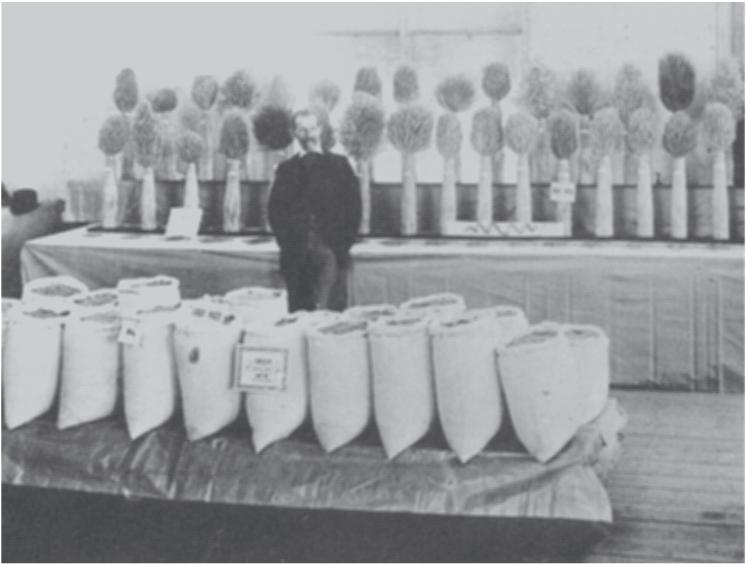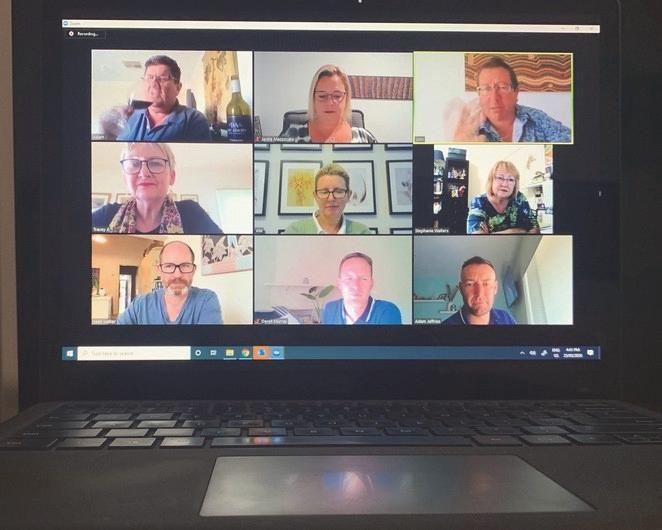Early Delamere settler credited with devising rust-proof wheat
B
orn in 1837, Daniel Leak, aged 16, was one of five children of William Leak (46) and his wife Martha (nee Wiseman, 42), from Yorkshire, who arrived at Port Adelaide aboard the 870-ton government ship Magdalena on 25 August 1853, having left Southampton on 23 May. Daniel’s other siblings were Sarah (his twin sister), Charles (aged 18, a joiner), Martha (aged 14) and Emma (12). Sisters Martha and Sarah were both listed as domestic servants. In 1855, the family moved to Yankalilla. Although listed on the ship’s passenger manifest as a sailor/ gardener, apparently William practised as a tailor (Williams, 1991). He also farmed on Section 1167 Yankalilla, south of the Bungala River, on Bethel Road. However, William died just three years later, in 1858, and was buried in the Wesleyan Church Cemetery at Normanville. Of William and Martha’s children who remained in the district, Martha married John J Christmas, who farmed at Yankalilla (Section 1040). He apparently also took over the farming operation on Section 1167. However, by 1870, the family moved to Kadina where John had become interested in mining. Martha and John had three children, the eldest Ernest William, born in 1862, became an artist of renown and travelled extensively; he
became a member of the Royal Society of British Artists and his works were distributed throughout Australia and New Zealand. Emma married John Illman in the Normanville Wesleyan Church in 1859 and lived at Delamere until moving to Adelaide in 1873. Daniel married Maria Susannah, daughter of George Mills of Willunga, and farmed at Glenburn (Delamere). The national wheat harvest of 1888-89 was disastrous due to an outbreak of rust which cost the wheat industry more than £2 million in lost production. According to Williams (1991), Daniel observed that an odd plant was free from rust when the majority of a crop of Tuscany wheat was badly infected. The ripened heads of these plants were collected, the best grains selected and reproduced and, by tedious selection over a long period, in which the whole family was involved, grain was separated and reproduced to provide seed for a specific strain of wheat. Daniel Leak exhibited his wheat at the Adelaide Show in 1892. This preceded the breeding of wheat undertaken by leading agronomist William Farrer, who experimented with crossbreeds of wheat to come up with the ‘Federation’ variety which began being distributed from 1903. Writing in the Australasian of 30 January 1892, Farrer said: ‘Another excellent variety that is available is also of South Australian origin. Its name is Leak’s Wheat (Leak’s Rust-proof) and it is about four days later than Steinwedel. My researches of it appear to indicate that Leak’s is, of all the very early sorts, the least liable to the more serious form of rust, Puccinia gamminus. Leak’s Wheat holds its grain as well as does any variety I know, and I would certainly recommend farmers to give it a trial.’ Seed from this strain was used extensively for hay and a small amount was still being planted in the 1980s. The nine children of Daniel and Maria Leak – Annie, Edwin, William, Elsie, James, Charles, Frederick, Frances and Gertrude – all attended the
Delamere School. Maria died at Delamere on 6 November 1909, aged 69, and was buried at Bullaparinga Cemetery, Stockyard Hill Road, Delamere. Daniel died on 9 August 1919, aged 68, and is buried with his wife. – Lorraine Day
T
he Yankalilla & District Historical Society Inc. normally meets on the second Monday of the months of September, October, November, February, March at 8pm at the Council Chambers. However, due to Covid-19 guidelines, there will be no meetings until further notice. Note: Williams (1991) refers to the book ‘To Find The Way’ by R.F. Williams. Left: Daniel Leak at his Adelaide Show exhibit, 1892 Above: Daniel Leak (1837-1919) Bullaparinga Cemetery
Heritage Fleurieu Coast
A
s you no doubt know, due to the coronavirus, the History Trust has cancelled the 2020 History Festival, which means that the Heritage Fleurieu Coast Festival is also cancelled. The committee has decided not to postpone the Festival or hold it in 2021. We will wait until 2022. However, there were 50 events planned and some of them will trickle into the district quietly while the restrictions are in place and more once the
restrictions are lifted, so look out for heritage themed surprises in your area. There are new plaques planned for some places, like on the Second Valley Heritage Trail. You could go for a walk and enjoy the trail while looking out for the new plaques. The Delamere flagpole project is also going ahead and while you are passing, drop into the Delamere Store, not for toilet rolls but to buy a copy of the new release from the Historical Society, Tour of Old Delamere and Bullaparinga. The book will also be available from the Yankalilla Visitor Centre when it re-opens. Some events may be held as part of the Festival Fleurieu in 2021 or as part of the 2021 History Festival, but that will be the decision of the event organisers. We are very sorry that the Festival could not go ahead, as we had a wonderful program organised. Some of these events will be held over until 2022. The committee of HFC would like to thank the community very much for your support and hard work over the past few months, and we hope that you keep safe over the next few months. For more updates check the Facebook page: heritage fleurieu coast festival 2020
General Builder New Homes Extensions Renovations Bathrooms www.quantumbuild.net Phone Marty on
0413 164 258 P.O. Box 807 Normanville 5024 Also, in line with all public libraries in South Australia being closed until further notice, the Yankalilla and District Historical Society will be unable to continue the weekly sessions at Yankalilla Library to assist with local and family history but will still be available by email yank.hist.soc@gmail.com Sue Speck Heritage Fleurieu Coast Festival Committee Far left: Book cover Left: Old Rapid Bay Council Chambers at Delamere
Yankalilla Regional News - May 2020 - Page 27


